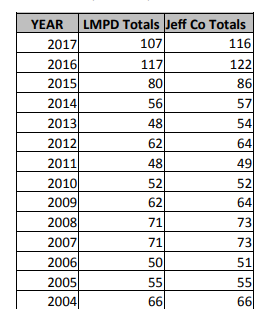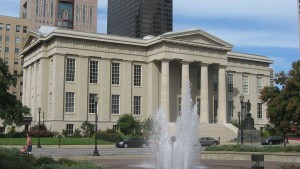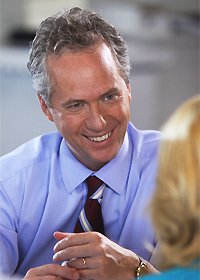Angela Leet Releases Statement on Crime Numbers
Mayoral candidate and current District 7 Councilwoman Angela Leet called the Fischer Administration’s claim that crime is down, “dishonest.”
“This claim is absolutely disingenuous. During Fischer’s first year in office, there were 49 homicides in the county. Last year, there were 108 homicides in the county. This year, we are currently on track to double the number of homicides in Fischer’s first year. So seeing a tiny downtick in a few week’s time is not a victory when all Fischer has managed to do is set a new normal of more than a 100 homicides a year,” said Leet.
 In a 2005 survey, Morgan Quitno Press ranked Louisville as the seventh safest large city in the United States with that rank dropping to number eight in the 2006 edition of the survey. Lousiville, however, failed to make independent security review site SafeWise’s 2017 list of 50 Safest Metro Cities in America at all and came in at 106 in WalletHub’s 2017’s Safest Cities in America rankings.
In a 2005 survey, Morgan Quitno Press ranked Louisville as the seventh safest large city in the United States with that rank dropping to number eight in the 2006 edition of the survey. Lousiville, however, failed to make independent security review site SafeWise’s 2017 list of 50 Safest Metro Cities in America at all and came in at 106 in WalletHub’s 2017’s Safest Cities in America rankings.
Leet claimed that the legacy of the Fischer Administration would be that “homicides have doubled, shootings have doubled, and drug overdose deaths have tripled” under the oversight of the current mayor.
The LMPD historical homicide data does show a dramatic uptick in murders over the past several years. The highest number of murders since 1960, the earliest year in which data is available, was 2016’s record setting year with 122 homicides in Jefferson County, followed closely by 2017’s number of 116 total homicides.
Fischer’s first year in office, 2011, saw the lowest number of homicides since 2003. The several years following his tenure as Mayor showed measurably higher numbers before beginning their remarkable increase to the numbers seen in recent years.
Leet continued, “For the 10 years prior to Fischer taking office, U of L Hospital admitted an average of 166 gunshot victims per year. During the Fischer Administration, U of L Hospital has seen an average of over 200 shooting victims, and that average is over 300 for the last 2 years. 1700 people have been admitted to University of Louisville Hospital for gunshot wounds since Fischer took office. That does not even include victims who were not admitted.”
Putting a rosy spin on crime numbers is nothing new, however. Last August we published the city’s release claiming that crime overall in Lousiville was down 4%, driven by large decreases in violent crimes such as rape and robbery, and smaller decreases in property crimes like larceny. The article, however, noted then that homicides were up by 20% over the previous year’s data.
However, Leet said of Fischer’s attempt “to spin a tale of ‘crime is down'” in a year in which he is up for reelection, “I am disappointed that Fischer is manipulating numbers and denying the reality of drug and gang issues in our neighborhoods.“
 Citizens interested in adding their voice to the review of public art that could be interpreted to honor bigotry, discrimination, racism and/or slavery now have an online forum to share their thoughts.
Citizens interested in adding their voice to the review of public art that could be interpreted to honor bigotry, discrimination, racism and/or slavery now have an online forum to share their thoughts.
People can visit https://louisvilleky.gov/government/public-art/public-art-review and add their thoughts to the public conversation.
“Getting citizens input from all sides is important – we want to hear from a wide variety of people,” Mayor Greg Fischer said.
On Sunday, Fischer announced that he asked the Louisville Commission on Public Art to review its catalogue of art in the public right of way to develop a list of those tied to discrimination, racism and slavery, in preparation for a community conversation about their display.
The Mayor’s remarks come after a day of violence surrounding a white nationalists rally in Charlottesville, Va., that left three people dead and 35 injured. The review also came after a statue of Confederate officer John Breckinridge Castleman in the Cherokee Triangle neighborhood was vandalized.
“For many, the Castleman statue is a beloved neighborhood landmark, but for others, it’s a symbol of a painful, tragic and divisive time in our history — which gets at the complexity of this conversation,” the Mayor said.
Sarah Lindgren, the city’s public art administrator, said the Commission on Public Art will announce before the week’s end a series of public meetings to gather further input.
“This is an opportunity for citizens to both speak and listen,” Lindgren said.
 Mayor Greg Fischer announced today that he’s directing the Louisville Commission on Public Art to review its catalogue of public art to develop a list of pieces that can be interpreted to be honoring bigotry, racism and/or slavery. This is in preparation for a community conversation about their display.
Mayor Greg Fischer announced today that he’s directing the Louisville Commission on Public Art to review its catalogue of public art to develop a list of pieces that can be interpreted to be honoring bigotry, racism and/or slavery. This is in preparation for a community conversation about their display.
“I recognize that some people say all these monuments should be left alone, because they are part of our history,” Fischer said. “But we need to discuss and interpret our history from multiple perspectives and from different viewpoints. That’s why a community conversation is crucial.”
“Both our human values and the future of our city depend on our ability to directly address the challenges that stop each and every citizen from realizing their potential. We, as a compassionate community, must again come together and face up to the stain of slavery and racism, as we move toward a future that embraces diversity as a strength,” the Mayor said.
The Mayor’s remarks come one day after violence surrounding a white nationalists’ rally in Charlottesville, VA that left three people dead and 35 injured — and nearly a year after the city removed the Confederate Monument at the University of Louisville. The Virginia rally was convened by white nationalists who oppose a plan to remove a statue of Confederate Gen. Robert E. Lee from a city park.
Early this morning, a statue of Confederate officer and President of the Board of Park Commissioners John Breckinridge Castleman in the Cherokee Triangle neighborhood was vandalized with orange paint. The statue, constructed in 1913, has long been a neighborhood landmark honoring Castleman’s contributions to creating the neighborhood around it, and the Cherokee Neighborhood Association paid thousands to have it restored in 2013.
“For many, this statue is a beloved neighborhood landmark, but for others, it’s a symbol of a painful, tragic and divisive time in our history — which gets at the complexity of this conversation,” the Mayor said. “I believe this is community conversation worth having.”
An effort to remove the paint from the Castleman statue today was halted until the conservator who led its restoration in 2013 could be consulted. The city also is reaching out to the Kentucky Historical Society to discuss how to address vandalism to a nearby sign that the city maintains.
The Confederate Monument on U of L’s campus was moved last fall to become part of an historic Civil War site in neighboring Brandenburg, KY
Attorney General Andy Beshear and 20 other state attorneys general have submitted public comments to Education Secretary Betsy DeVos, calling a move by the U.S. Department of Education to replace existing student protections a “waste of resources and a betrayal of students.”
The July 12 comments are in response to the department’s June 14 announcement of intentions to delay large portions of the Borrower Defense Rule, which was designed to hold abusive higher education institutions accountable for cheating students and taxpayers out of billions of dollars in federal loans.
According to the attorneys general, the Borrower Defense Rule was created in large part by state and federal investigations into for-profit schools like the now-defunct Corinthian Colleges, and was finalized after robust and thorough negotiated rulemaking with input from numerous stakeholders.
Beshear said the department announced it would withdraw the Rule without soliciting, receiving or responding to any comment from the public, and without engaging in the required process.
“It is my hope that the department will not cast aside all the hard work and progress achieved during its previous rulemakings and turn its back on the critical protections it promised to borrowers,” Beshear said. “Attorneys general and all the stakeholders must continue to pressure the department to protect students from abuse at the hands of predatory schools.”
Under the Borrower Defense Rule, a successful enforcement action against a school by a state attorney general entitles borrowers to obtain loan forgiveness, and enables the Department of Education to seek repayment of any amounts forgiven from the school.
The attorneys general also oppose the department’s efforts to replace the Gainful Employment Rule, which empowers students to make informed decisions about their education and protects students from programs that will leave them with burdensome debt and poor job prospects.
For-profit colleges AGs have investigated and taken enforcement actions against include: American Career Institute; Ashford University/Bridgepoint Education Inc.; Corinthian Colleges Inc.; Career Education Corporation; Education Management Corporation; Daymar College; DeVry University; ITT Tech; National College of Kentucky and Westwood Colleges.
Beshear’s office is committed to holding for-profit colleges accountable in Kentucky and is working to help defrauded students.
- In December 2016, Beshear announced nearly 3,500 former students of Daymar College’s Kentucky campuses and online programs will receive restitution checks totaling $1.2 million. The payments are pursuant to a settlement agreement the Office of the Attorney General entered into with Daymar in 2015 resolving a consumer protection lawsuit.
- In August 2016, Beshear announced that the Kentucky Court of Appeals had affirmed a previous order by Franklin Circuit Court requiring National College of Kentucky Inc. and its attorneys to pay the state a combined $157,000 in civil monetary sanctions. The Kentucky Supreme Court declined in April to take up National College’s request to overturn the appeals’ court decision.
- In March 2016, Beshear joined seven other state attorneys general in asking the U.S. Department of Veterans Affairs to restore educational and vocational benefits to thousands of veterans victimized by Corinthian Colleges Inc. for predatory practices. Kentucky veterans are among the 2,000 students who received letters from Beshear regarding their federal loans.
Beshear said students who have been a victim of a for-profit college may contact his office by phone, 502-696-5300, or by completing a complaint form.

Twitter/@realDonaldTrump
President Donald Trump visited Louisville this evening for a rally in Freedom Hall. The arena was filled to capacity with supporters holding “Women For Trump,” “Promises Made, Promises Kept,” and “Buy American, Hire American” signs as well as the omnipresent “Make America Great Again” caps while a long line of people stood outside hoping to be let in.
Not everyone in attendance was a supporter, however, as there was a scattering of several protesters outside of the event.
During the event, President Trump hit on all of his usual talking points including terrorism, imigration, tax reform, crime and drugs, trade agreements, and the Second Amendment.
He covered the repeal and replacement of the Affordable Care Act (ACA) in depth, while making multiple references to US Congressmen Andy Barr and James Comer (both from Kentucky) for their help and a reference to the efforts of US Senator Rand Paul in making sure the replacement is not just “Obamacare lite”. He pointed out that as many one third of the counties in the entire US are limited to only one health insurance provider because of the regulations that the ACA put into place, causing health insurance companies to pull out of many markets.
He went on to outline that the real issue is not just the cost of health insurance, but the cost of health care and medicines. Trump tied in tax reform with this repeal and replacement, stating that the administration cannot accomplish tax reform until they know how the new health law will be structured. The President was very optimistic with the replacement plan that is coming forth and is confident that a plan that will make everyone happy will be on his desk at the end of the day.
Near and dear to many Kentucky workers, Trump also specifically mentioned the automobile manufacturing and coal industries. He recently signed a bill that eliminated a piece of regulation that many supporters of the repeal believe was put into place to shrink the coal industry by requiring coal mines to spend millions on compliance costs. More than 600 coal mines have closed since the 2009 regulation went into effect. Since the rule has been revoked, many coal mines have slightly increased their labor force, but POTUS Trump promised that this is just the beginning.
No Trump event would be complete without Trump’s trademark jabs at the “fake news” and former political rival Hilary Clinton. The President even made light of the Louisville Cardinals men’s basketball team’s second-round elimination from the 2017 NCAA basketball tournament. He did continue on to say, “They are a great team, great coach.”
According to Kentucky’s The Family Foundation, nearly half the money contributed last year to a political action committee that opposed Republican candidates in state legislative races came from teacher’s PACS and teachers’ union PACs that oppose school choice and charter schools, and more than two-thirds of the contributions came from out-of-state.
Kentucky Family Values received $3,300,769 in the Fall 2016 general election, $1,375,000 that came from teachers’ PACs. And, of that $3,300,769, $2,216,279 came from out of state.
“Kentucky Family Values spent its money supporting Democrats and opposing Republicans in state legislative races,” said Martin Cothran spokesman for the group. “These are groups that represent the educational status quo in this state who are now asking the very people whose election they opposed to give credence to their arguments against parental choice.”
In the two months immediately prior to the Fall 2014 general election, Kentucky Family Values received $1,617,575, over half of which was from out-of-state entities and $650,000 of which was contributed by teachers’ groups.
Citing $9 billion in investments – ranging from new libraries in Okolona and the east end, to restoration of Colonial Gardens in the south end, to 23 new hotels in and around downtown – Mayor Greg Fischer focused his seventh annual State of the City address on Louisville as “one rising American city.”
“Our city overall has achieved a level of prosperity unlike anything in recent memory,” he said in remarks made during a Downtown Rotary Club luncheon held at the Baxter Community Center at Beecher Terrace.
But there is work yet to do, he said, noting that, “To take our place alongside great global cities, we have to ensure that prosperity spreads throughout our city.”
(Read Mayor Fischer’s entire speech here)
In his six years in office, the Mayor has rotated the location for the State of City address throughout the community. This year’s location was a nod to one of Louisville Metro Government’s biggest recent announcements – a $29.5 million federal grant to redevelop the Russell neighborhood, which Mayor Fischer said is “a tremendous and important opportunity” that will have ripple effects throughout the city.
In a speech that centered on economic and job growth throughout Louisville’s many diverse neighborhoods, the Mayor noted that Russell has a proud past and a promising future.
“I can’t think of a better place from which to examine where we’ve been, where we are, and where we’re going,” he said.
In an overview to open his speech, he said the city has seen:
- Creation of 61,000 new jobs and 2,600 new businesses;
- Our unemployment rate drop from more than 10 percent to 3.5 percent, the lowest in 15 years;
- Our median wage, adjusted for the cost of living, increase every year since 2008. In 2015 alone, more than 10,000 Louisvillians lifted themselves out of poverty, and more than 7,000 Louisville families joined the middle class.
As he took his audience on a virtual tour of the city, the Mayor highlighted the $320 million Omni Louisville Hotel in downtown; new restaurants and businesses in NuLu, Butchertown, Sheppard Square and Portland; and library expansions and construction in south Louisville, St. Matthews and east Jefferson County.
He noted that Louisville has become a top-tier tourist destination, welcoming over 24 million tourist visits a year, largely thanks to Bourbonism, which brings people to the city year-round for restaurant and distillery experiences on our Urban Bourbon trail.
He also highlighted the city’s commitment to affordable housing, as witnessed by a $2.5 million allocation for the Affordable Housing Trust Fund this fiscal year, and $12 million in loans and support from Louisville CARES to develop more affordable units in all corners of our community.
Emphasizing Metro’s focus on jobs and economic development, the Mayor discussed the Global Louisville Action Plan, which lays out strategies to attract, retain and grow our foreign-born population. “A great city must be a global city,” he said. “We need people who can help us think, work, connect and compete globally.”
The Mayor also announced during his speech that:
- He is asking the Metro Council to add hookah and e-cigarettes to the city’s Smoke Free ordinance.
- The Compassionate School Project, which began with three Jefferson County Public Schools in 2015, is expanding to 25 schools next year.
- Metro Government has received a $100,000 grant from the National Endowment for the Humanities to support the Cultural Pass, which provides the city’s children with free access to dozens of our city’s great cultural institutions.
Mayor Fischer closed his remarks by urging Louisville’s residents to take an active part in helping the city succeed.
“The people who have the greatest power to shape the future of Louisville are the people of Louisville,” he said. And, “To make the most of that power, we must face the opportunities and challenges before us together, as one community. Our fates are as connected as our streets and the air we breathe.”
 Weather
Weather Traffic
Traffic @LouisvilleDispatch
@LouisvilleDispatch @LouisvilleDisp
@LouisvilleDisp Subscribe
Subscribe